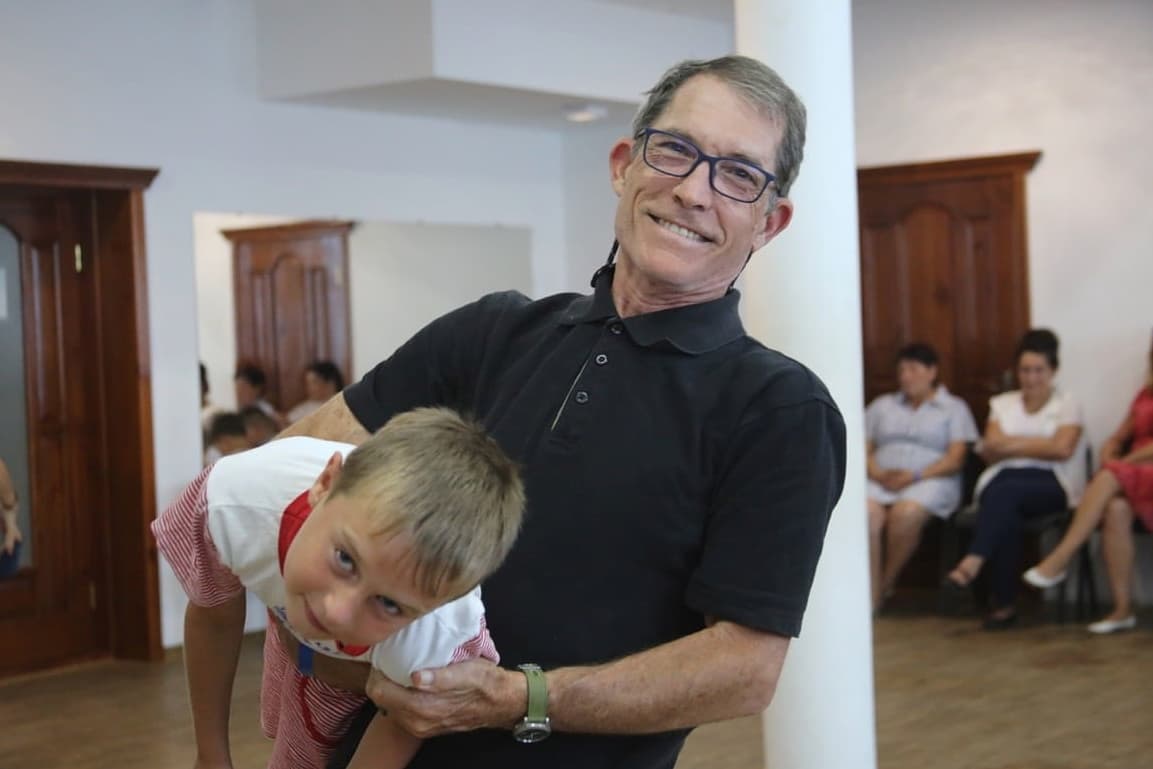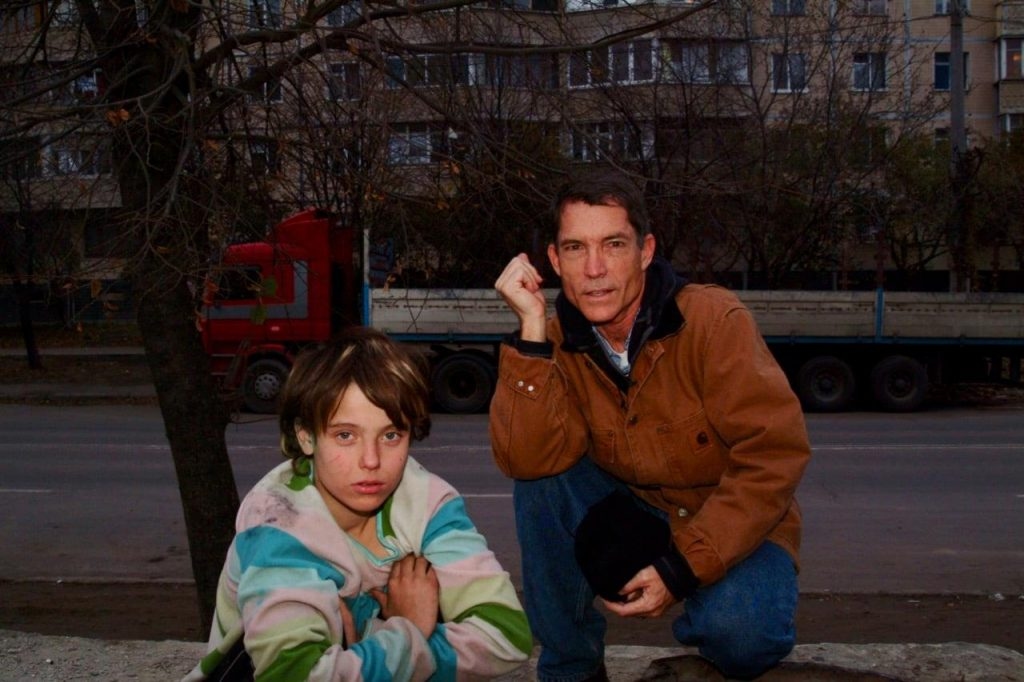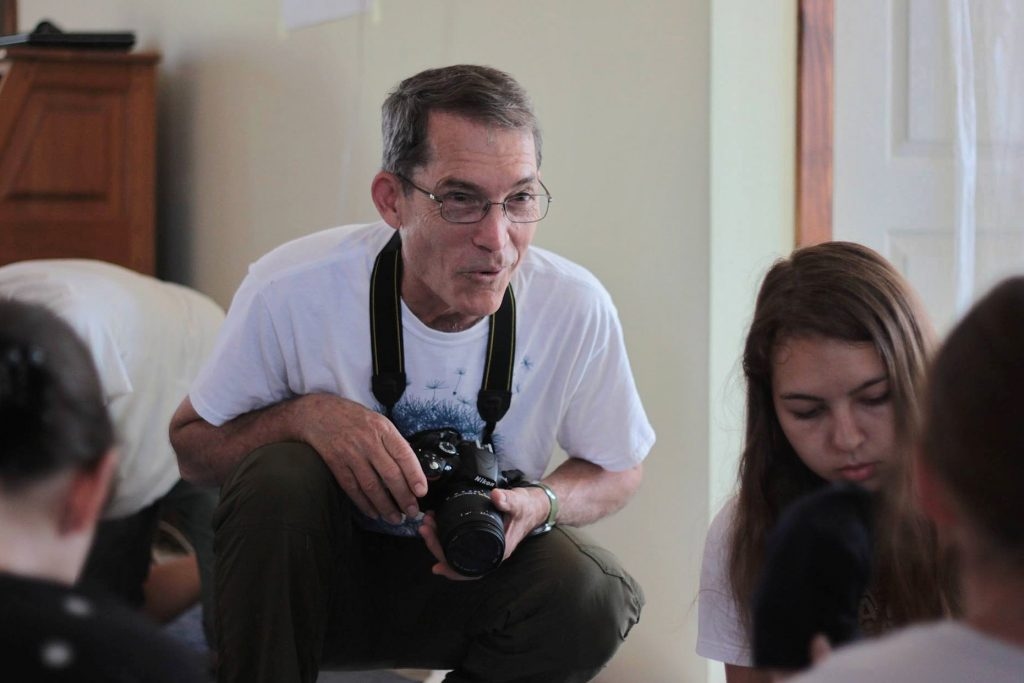US Presbyterian minister’s mission to find a home for every orphan in Ukraine

One early September 16 years ago, U.S. Presbyterian minister Robert Gamble got off the train in Odesa, Ukraine’s biggest port city, where he had chosen to spend his sabbatical.
He did not speak any Ukrainian or Russian, and had neither relatives nor friends in the region. His only lifeline was a small piece of paper with a hand-written phone number of someone in the city who could speak English.
He was there for a reason: Gamble had heard about the high number of orphans in Ukraine, both in orphanages and on the streets. He already had experience of working with children, and was determined to help.
He called the number he’d been given, and was advised to take a tram to a nearby hotel. As he stood in the lobby, trying to explain to the bemused staff what he was looking for, he heard a voice from behind.
“Are you American? What are you doing here?” a woman asked.
She was a young Estonian volunteer working for a local charity called The Way Home (“Doroha Dodomu” in Ukrainian), which has been supporting homeless children in Odesa since 1996.
The woman invited Gamble to volunteer for the charity. It was the beginning of something that became much more than a three-month sabbatical: Gamble ended up changing not only his own life but the lives of numerous children as well.
There are currently almost 69,000 children in orphanages all over Ukraine, according to Ukraine’s social policy ministry.
On average, 10,000 children become orphans every year. While many of them end up in orphanages, and some even run away and become homeless, the number of adoptions in the country remains relatively low: In 2020, only 1,239 children were adopted.
After seeing the everyday struggle of the children he helped, Gamble, now 70, decided to launch his own nonprofit and move to Odesa. He did so in 2006.
His organization, This Child Here, began by supporting homeless children and soon launched various training programs for orphans, foster families, those displaced by the war in the Donbas, and more.
But Gamble is yet to achieve his biggest goal – to find a home and a loving family for every child in Ukraine.
“Every child deserves a life grounded in dignity and peace,” he says.
Lifesaving business
Gamble himself did not have a “regular” childhood: He was born in Rhode Island, but since his father was a Navy officer the family had to relocate and travel a lot.
“I’m from a lot of places,” Gamble says. “We stayed two years in the (United) States and three years overseas.”
Nevertheless, Gamble had a happy childhood. Thanks to the constant traveling, he was able to explore different places and meet children of different nationalities, and the habit to travel became deeply rooted in his life.
Gamble studied at the U.S. Coast Guard Academy in Connecticut. He recalls his father joking that it was the “hooligan navy.” Though he learned a lot of life-saving techniques there, five years into his service as an officer in the Coast Guard Gamble started to feel he was interested in something else.
“There is not a lot of room for creativity in the military, so I was very interested in the spiritual side of things,” he says.
Even during his service as the commanding officer of a Coast Guard base in Missouri, Gamble was already involved with the church: He was working with youngsters at a local church as a volunteer when he confided to his pastor that he was thinking of leaving the Coast Guard and becoming a youth social worker.
“He said to me ‘No, you are not going to do that,’” Gamble recalls, saying that the pastor suggested that he attend a seminary. The young officer duly did so.

He says his parents were “nervous” when they heard about their son’s decision, but changed their minds as soon as they saw the school and realized what he was going to learn there.
“It wasn’t difficult for them to understand at that point,” Gamble says.
His mother was a Presbyterian, so he chose the seminary of the Presbyterian Church (USA) in Atlanta, Georgia, to learn theology, languages, ethics, history, and more. What most attracted Gamble to an ecclesiastical life were the relationships that he was about to establish.
“You're closer with people,” Gamble says. “You don’t wear a uniform, trying to deal with those boundaries, you can talk about things that are more important in life.”
“I’ve always been in the life-saving business: Coast Guard, churches, and now in Ukraine,” he adds. “That has been the pattern of my life.”
Nicaraguan orphans
When the largest country in Central America, Nicaragua, turned into a warzone in the 1980s, Gamble went there as a chairperson of the peacemaking task force of Presbyterian Churches in Tennessee.
It was not the war that impressed him the most, but rather the kids he met at an orphanage there.
“I remember sitting down with my Nikon camera, just shooting the faces of children who gathered around me,” he says, adding that he saw the pictures only after coming back to the U.S.
“The faces of those children… they stuck with me,” Gamble says.
He had worked with children at church before, but not with orphans who dream of being cared for by a loving family, but don’t have one. Gamble was determined to return to them.
He came back in the 1990s, bringing his three sons and some other teenagers, mostly from his church, to interact with the orphans and help them learn something new from each other. They played games, music, and made art together, but most importantly, they bonded.
“People change people,” Gamble says.
He believes that medicine and food can save lives, but it takes a person to truly change others.
“I'm a little more pessimistic about changing adults’ lives, but with young people – you have a chance of that.”
Henceforth, Gamble decided to continue supporting orphans in need.
He would keep coming back to Nicaragua until the early 2000s, when he heard about the tens of thousands of orphans living in Ukraine. His sabbatical was just around the corner, so Gamble decided to go on a long journey to Ukraine and ended up in Odesa.
“It was all strange and weird for me,” Gamble recalls his first hours in the city. “I took a little tram to the hotel and there were only a few people on it, and then a dog got on, two stops later the dog got off,” he laughs.
He soon started volunteering for The Way Home, driving along with their “social patrol” looking for children who were living on the streets to bring them to the charity’s shelters.
After he returned to the U.S., one thought began to haunt Gamble: He wanted to return to Ukraine to change the lives of those kids.
He now says that coming back and founding his own charity was one of the wisest things he has done.

This Child Here
Throughout its first two years, This Child Here was working mainly with homeless children, trying to bring them to The Way Home’s shelter. Though there were no recorded statistics of children living on the streets of Odesa back then, Gamble says he soon began to notice fewer homeless youth.
Many of those who ended up on the streets had run away from orphanages, looking for more freedom.
The team therefore began working with children in orphanages to help them form a sense of community and convince them not to run away.
“We could simply spend two days there, doing work with those children, trying to help them trust each other,” Gamble says.
They had a special program with games designed to create bonds between children, teach them decision-making skills, and more. Back then, Gamble believed there was room for orphanages in the system.
“I no longer do,” he says.
“Every child that lives in orphanages has trauma,” Gamble says. “It puts a pause on a child’s development.”
The biggest step in finding a family for every orphaned child was to start training candidates for adoptive parents in 2014.
“We decided to put our energy into families more,” Gamble says.
This Child Here now holds lectures and workshops to prepare parents for future challenges, making sure that families don’t feel the need to bring children back to orphanages. The organisation has trained over 600 parents in five years.
They stepped in when Russia started its war against Ukraine in 2014, displacing thousands of Ukrainians from their homes: The nonprofit launched special “Peace Camps” for families displaced by the war, allowing them to rest by the sea and play games, as well as spend time with other people who have also lost their homes.
The war also pushed This Child Here to start training teenagers in the techniques of peacemaking. They teamed up with Ukraine’s Minor Academy of Science and got 200 letters from kids from all over Ukraine who wanted to participate, with 16 of them being selected for the training.
“The final exam was for this whole group of kids to come to a consensus on a question,” Gamble says. “It took them seven hours.”
This Child Here also supports single-parent families living in poverty across Odesa, along with a special program for children of Ukrainian soldiers. In 2021, they held their first camp for foster families with children, and plan to run it again this year.
Throughout his time in Ukraine, Gamble has been traveling back and forth to the U.S. to raise money and see his family. Yet he calls Ukraine a place where his life truly happens.
As he cherishes his personal connections, and believes in people changing people, Gamble still keeps in touch with some of those children he helped rescue from the streets back in the 2000s. Seeing them live happy and fulfilling lives is the best reward for his work.
“For every child a home, for every child a family, that is what I firmly believe,” Gamble says.
Donate to “This Child Here” at www.thischildhere.org










